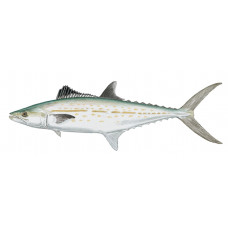Latin name
Scomberomorus regalis
Other names
Cero, spotted cero, king mackerel, black-spotted Spanish mackerel; French: thazard franc; Portuguese: cavala-branca; Spanish: carite, cavalla, pintada, sierra.
Identification
The body shape is typical of king mackerel. The mackerel is iridescent bluish-green above and silvery below, with rows of short yellow-brown spots on top. It also has yellow-orange stripes and a dark band on the bottom that runs the entire length of the body from the pectoral fin to the base of the tail. The anterior part of the first dorsal fin is bluish-black and has 17-18 spines and 15-18 gill rakes on the first arch. The pectoral fins are covered with small scales. It differs from the king mackerel and Spanish mackerel in the pattern of spots, which are rather elongated and arranged in lines rather than scattered. Has a lateral line that curves down evenly to the base of the tail. The swim bladder is absent.
Distribution
Occurs in tropical and subtropical waters of the western Atlantic Ocean, distributed from Massachusetts to Brazil. Numerous in the Florida Keys, Bahamas, Antilles, Cuban Islands, Gulf of Mexico and Caribbean Sea.
Habitat
Epipelagic neritic species. It lives in tropical and subtropical waters in coastal and marine areas, preferring clear waters around coral reefs and shipwrecks. Usually lives alone or travels in small groups.
Size
The world record catch weighed 17 pounds, 2 ounces. Usually, this species weighs less than 5 pounds.
Life history and Behavior
These fish spawn in the sea in mid-summer.
Food and feeding habits
It feeds mainly on small schooling fish such as sardines, anchovies, sawfish, herring, and herring, as well as squid and shrimp.
Reproduction
It spawns throughout the year. The fecundity of fish 16-80 cm in length varies from 160 thousand to 2.2 million eggs. Adult fish are up to 84 cm long and weigh up to 4.9 kg. Males mature at 32-35 cm in length, females - 38 cm.
| Classification | |
| Phylum | Chordata |
| Class | Actinopterygii |
| Squad | Scombriformes |
| Family | Scombridae |
| Genus | Scomberomorus |
| Species | S. regalis |
| Features | |
| Conservation status | Least Concern |
| Habitat | Pelagic |
| Life span, years | No information |
| Maximum body weight, kg | 7.6 |
| Maximum length, cm | 83.5 |
| Sailing speed, m/s | No information |
| Threat to people | Edible |
| Way of eating | Predator |

